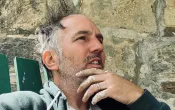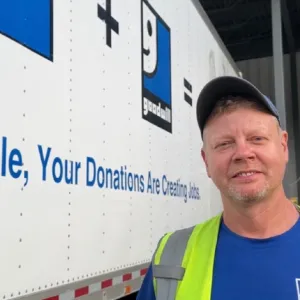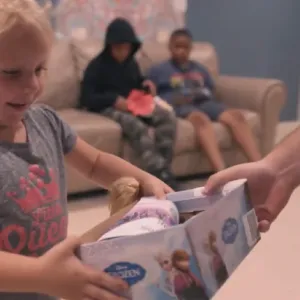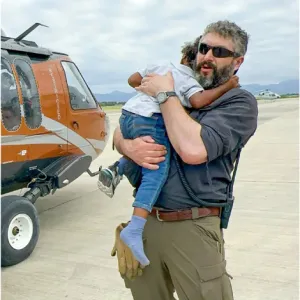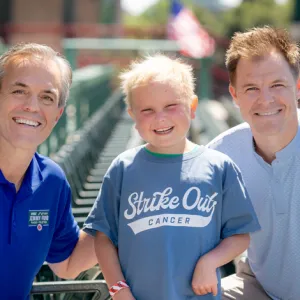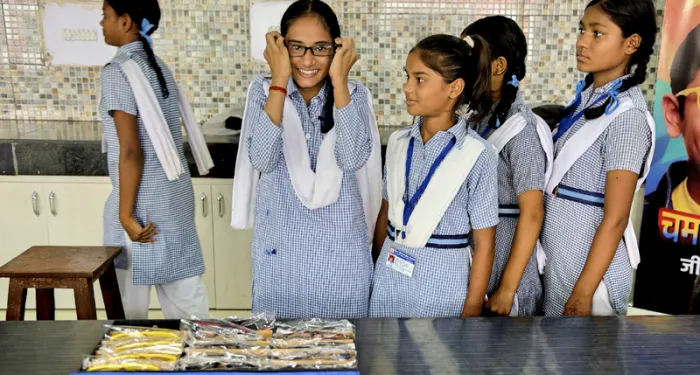
Jordan Kassalow
Giving Sight to the Blind: VisionSpring
Vision isn’t just sight. It’s opportunity. VisionSpring brings it to millions around the globe each year. It started with one personal transformation.
First I'd heard so much about our guest, Jordan Kassalow of VisionSpring, from friends, family, and colleagues — and it was all so positive. But I have to tell you, folks: This conversation surpassed even my highest expectations. The quotes he offered about why he does what he does, and his suggestions for helping others find their own personal mission, were truly remarkable, as you'll see.
I also believe VisionSpring is one of the most important and innovative charities in the world. Here are some facts about it, and the problem it's helping tackle:
- More than 2.5 billion people worldwide could have their vision restored with proper eyecare.
- This diminishes their quality of life on every level. As Jordan will describe later, vision isn't just seeing things more clearly. Vision is opportunity. For a young person, it's the chance to do well at school. For the grown, it's the chance to be productive and independent.
- In a large number of cases, these vision problems could be solved with extremely simple measures. Store bought reading glasses are all that roughly a third of those patients need. Many others require fairly common prescriptions.
- When you provide the right prescription to someone who's never had proper eyecare, you are literally giving sight to the blind. That used to be known as a miracle. It's one that Jordan and VisionSpring workers around the globe are doing daily.
- Today VisionSpring is fighting back by helping more than a million people per year. And they have a smart approach that not only provides better sight to so many, it also creates business opportunities for people in some of the poorest regions in the world.
In addition to all of this, Jordan has his own story of personal transformation. And he's written a powerful new book titled Dare to Matter: Your Path to Making a Difference Now. I've read it twice since receiving it, and cannot say enough good things about it. I love it so much that we're giving away 50 copies. Sign up for your chance to win here.
What follows is a conversation that I think you will love. You can listen to it on Apple Podcasts, Stitcher, Overcast, or stream it directly here. I'd love to hear your thoughts after listening. You can share them with me in the comments below.
FRANK BLAKE: Welcome, Jordan. It's great to have you on the show.
JORDAN KASSALOW: Thank you, Frank. It's lovely to be here. I really look forward to our conversation.
FRANK BLAKE: Let's start with you have an amazing story of finding your purpose. Would you share that for our audience?
JORDAN KASSALOW: Absolutely. Very few people can say that there was a moment in time that fundamentally transformed their lives, but I could point to just that moment.
I was 23 years old. I was studying to be an eye doctor and joined an organization that brought eyecare to underserved populations in Mexico,
We were in a small town about 30 miles from Merida, which is in the Yucatan Peninsula. When we arrived at the clinic, there were 2000 people in line winding around the building multiple times. It was like Apple had just released its latest iPhone, and there were babies to people in their 90s waiting in this hot line in the sun. There were mothers with babies carrying them in their traditional garb. We walked into the clinic and I took my post, and my very first patient was a seven year old boy who was blind — or at least he thought he was blind. His parents thought he was blind. That was Raul.
His mother had that look of almost desperate concern of is there any hope for my child? You have to realize that blindness in those parts of the world are analogous to being cursed. There's a lot of witchcraft kind of thinking. And not only was he cursed, but the family was cursed because they had a blind person, so there's a lot of social ostracization that relates to it.
After examining his eyes, we recognized that his eyes were perfectly healthy, but he just needed a super strong pair of eyeglasses.
For your audiences out there, some people might know their prescriptions as minus two or three or six or eight, very high nearsighted patients. This boy was a minus 20 meaning he couldn't even see an inch past his nose.
I found the glasses and it was like a 90% match for his prescription, and as I aligned the lens with his eyes and he saw for the first time, this universal smile of joy just spread across his face. His eyes widened and it was the most joyful smile that you could ever imagine, and it was a look of both joy and amazement at the same time.
I knew at that moment that if I could replicate that a bunch of times over that I would be successful. No matter how many cars I had or how many apartments I had, if I could change people's lives in such a real way, I knew that was a path to success.
Mark Twain, one of his famous quotes is, "The two most important days of your life are the day that you're born and the day that you found out why," and that was the day I found out why.
FRANK BLAKE: Wow. Wow, what an amazing story. Did you have much volunteer experience before that moment?
JORDAN KASSALOW: That was my first volunteer experience in my life and he was my first patient, as well, so it was transformative, to say the least.
FRANK BLAKE: Did you imagine when you were doing that when you were going to Mexico that it would have that? Were you looking for that sort of effect or did just completely take you by surprise?
JORDAN KASSALOW: Well, it's interesting. If you roll back the clock six months before that, I was in the northern reaches of Alaska with two friends climbing in the Brooks Range. I took a solo hike up a mountain during an extremely windy, rainy day, and as I was hiking up that mountain, the world was conspiring to tell me that I was insignificant and that I was meaningless. It was a "dust in the wind" kind of moment.
I remember literally screaming at the wind, telling it that I mattered. It was a moment that I dared to matter, although I really didn't know how or why. So I was looking for a vehicle to make a difference in the world, and my heart was open to such an experience, but I had no idea that would be the moment.
When I went down to Mexico, it was really more to have a cool opportunity to help some people, to travel, to get out of the normal routine of being a student. So I wasn't necessarily expecting it at that moment, but I did have an open heart and I was looking for something that showed me that I did make a difference and that my life was worth living.
FRANK BLAKE: You have this amazing moment. How did you decide what to do next?
JORDAN KASSALOW: Well, that was my first patient of the week. We saw 2000 patients during that week, and I can tell you other very powerful stories, none quite like that because it that was the first.
When I got back to Boston, we analyzed the numbers and we saw that were 2000 patients that we saw during that week. 70% of them just needed a simple pair of eyeglasses. Half of them just needed a simple pair of reading glasses, the kind that you or I could get at the drug store for $10. So a third of effort were going into providing a service that in America was just a consumer product, and I thought that was ridiculous.
That really was the spark that made me think there must be a better way to approach this problem than having eye doctors flying halfway around the world to care for people who needed simple ready-made reading glasses so they could continue their work as weavers and tailors and artisans and coffee bean spreads and counters. That was the spark that made me ultimately find VisionSpring.
FRANK BLAKE: Maybe this is a good time for you to describe for our audience how VisionSpring works. How does it help?
JORDAN KASSALOW: I got the notion that, "Well, why couldn't we just train local women to start selling eyeglasses?" There were many women who needed jobs. And there were many people in their communities who needed simple vision services like these ready-made reading glasses, so they could continue to work in their jobs.
We got that idea of starting what we call our Vision Entrepreneur program. We got enough money to train 18 women in India on how to do that. About a third of them made some money, a third of them lost some money, and a third of them broke even. We've been iterating ever since on what made the one-third unsuccessful. We've developed models over the last decade that have expanded to where we now have over 30,000 women in business who are selling these ready-made reading glasses throughout the world in 23 countries.
The first year, we sold 800 pair of glasses. It took us 10 years to sell a million pairs. Now we're selling over a million per year through those programs. We also have other models in addition to the Vision Entrepreneur models. We have wholesale businesses now and retail businesses. We work with supply chains of large companies. So we have a bunch of different ways to sell glasses, but that was the root of our work at VisionSpring, the Vision Entrepreneur program.
FRANK BLAKE: One of the interesting things about this, from my perspective, is that you approach the problem not by doing something like donating glasses or donating and recycling glasses, but by selling them? Why? Why take that approach?
JORDAN KASSALOW: Well, this goes back to a story when I was still a student and we were using donated glasses. There I was a year later after I met Raul in Mexico, that seven year old boy I referred to.
This time we were in the western state of Choco, Columbia. It's the poorest state of Columbia, and it's called Choco because of the Choco Indians that live there.
We set up a temporary clinic. Again we saw 2000 patients. And in the throes of a very busy day, I met a woman named Noka, who was in her mid-40s. She was known as the blind lady in her village, and she had canoed a full day down river to come to your clinic. She, like that boy, was very nearsighted. She had never gotten a pair of glasses in her 40 plus years of living. She needed a very unusual prescription with a stigmatism, and we had one pair of glasses that matched what she needed.
We gave it to her, and we were all very proud that we had provided vision services and turned this blind lady into a sighted woman. Two days later, Noka reappears at the clinic and started the tell this story that, when she got back to the village, everyone was laughing at her because her glasses looked so ridiculous. She wanted a different pair.
We explained to her that the only pair we had that came even close to her very unusual prescription were the pair that she had. She was right in saying that the glasses were inappropriate, because although they matched her prescription, the only frame that we had was a 1950s cat eye pair of glasses with rhinestones. You can imagine that for a woman who was living in the frontiers of Colombia wearing traditional Indian garb, those glasses did look totally ridiculous on her and culturally inappropriate.
After we explained that of her, she did something that blew all of our minds. She took the glasses off, put them on a wooden table, and went back up river blind again. It just stopped me in my tracks.
I realized that if this woman is choosing blindness over what we're providing, we're doing something fundamentally wrong.
What we were doing wrong was not taking into the consideration the dignity of Noka. Glasses, whether you're rich or poor, are sitting right in the middle of your face. They have to be culturally appropriate. They have to be aspirational. They have to make you feel good about yourself. Otherwise you're not gonna wear them.
So that's when I started to think, "We've gotta do it a different way." And if we charged for the glasses, we get an immediate market feedback loop that if people are actually paying their hard-earned dollars, albeit a small amount, it was a testament to that we were providing them with products and services that they valued enough to pay for.
FRANK BLAKE: That is so brilliant. There's so much packed into that one story. I want to take maybe a part of that. One of the things I noticed on your website — and I wish it were on the website of every single company in the country — is you have a section on listening. How you listen, what you listen for, and why you listen. Would you give some context for that? It's one of the first times I've seen it on any website, that emphasis on listening.
JORDAN KASSALOW: The very first thing that we do always is listen to the people who we want to make our customers. We want to develop products and serve well. When it comes down to solving problems and the whole field of social entrepreneurship is that you're working with people, not problems. All of the challenges that we face have a cultural, anthropological, and local context to them. Unless you have a clear understanding of what those are, you're not going to develop products and services that speak to the needs, desires and aspirations that truly serve their needs, not something that we think they need.
We have to understand what they want and desire, and then create the product that is appropriate for them. So listening is very key and understanding local and cultural context is critical.
FRANK BLAKE: It is such a different appropriate, frankly, from a lot of companies and a lot of charitable efforts. They don't start with that listening exercise. I just think it's brilliant that you emphasize that so much. If I got it right, you started VisionSpring originally as a philanthropic arm of your for-profit business. Then a few years later, you decided to focus solely on the foundation. What was behind that personal shift for you?
JORDAN KASSALOW: Well, there was a bit of a watershed moment for me. I remember one of our customers on the for-profit business side was Bloomingdale's. I was sitting with the buyer of Bloomingdale's, who was a good customer, and we were talking about what color red was going to be in style for that year. We started to parse the different reds. I had just returned from India, where we were rolling up our sleeves and doing important work and providing vision services to people who didn't have access to them. And I was like, "Why am I sitting here deciding what kind of red there is? There's so much more important things to be doing." That was a moment where I said, "I really want to, over time, shift my energy to the work that I love, that I'm passionate about, that needs me most."
One of the things in life that I think is critical to happiness is the feeling of being needed. I'd ask our listeners think about this question:
What is the need out there that needs you most?
Try to align your life with that.
And so that was the moment that I realized that the need that needed me most was not the determination of what red was gonna be in our seasonal line. It was the people who were there in India who had no other option for eye care other than VisionSpring.
FRANK BLAKE: If I go back to something that you've written about that first experience in Mexico, one of the things you wrote was that you decided that if you could replicate that moment a thousand times, you'd have led a meaningful life. Is that definition of meaningful life tied to what you just described in terms of need and meeting needs, or how else would you define it?
JORDAN KASSALOW: Yeah. Actually, I've just written a book called Dare to Matter: Your Path to Making a Difference Now. In that book, my co-author, Jen Krause, and I talk about the fact that every human has two fundamental needs. One is the need to take care of themself. The other is the need to take care of something beyond themselves. What you realize is that if you tend to the need beyond yourself, it in fact is a feedback loop and ultimately, the benefit in there is to yourself.
Trying to find a life where you integrate those two very human needs is critical for a happy life a few as I'm concerned.
FRANK BLAKE: Well, that definitely sounds like a book well worth reading. That's a profound concept.
Are there any people who, as you've gone on this journey, have been instrumental in your learning? Who you look and you say, "Boy, the input from that person made a huge difference to me on my path?"
JORDAN KASSALOW: Well, it's funny because most of the people who have provided me with the most key insights and learnings are people like Raul and Noka. There was a woman who I met in central Cameroon. She was an illiterate farmer. I was working at the time on a disease called River Blindness. Going throughout the villages of central Cameroon and talking to people to better understand what they needed and what they valued most — again, a listening tour — I would always ask people that question.
As you can imagine, that list was things like: Better healthcare. Better education. Better housing. Better water. Better agricultural products. But when I met this woman, she said, "We really have only one fundamental need. That is opportunity. Because if we have opportunity, we can be self-reliant. And just like you, we want to be self-reliant. Then we can take care of all of our other needs,"
It was a profound moment where I realized that the meta-need out there is the ability to provide people with opportunity, so that they can be self-reliant and take care of their families the way that they see best fit.
That was another spark of a moment where I realized that vision was opportunity. Vision enabled children to thrive in school. Vision enabled weavers and tailors to thrive in the workplace and to stay employed. Vision enabled people to be safe on the roads and secure ambulating from place to place in their homes. So vision was a critical input to opportunity, so that was another incredibly important lesson.
FRANK BLAKE: One of the things I noticed on your website, you talk about providing people the dignity of choice. That connects directly to your last comment. In addition to that woman's comment, is that something that's developed over time? Or did that, too, come with the same spark of recognition?
JORDAN KASSALOW: Well, I think the dignity of choice came largely from that experience I had in Columbia with Noka. But then I saw it over and over again. Wherever you were, there were certain kinds of colors and shapes of frames that mattered to people, and that were culturally appropriate for them. So before we would develop a line of products for any particular part of the world, we would make sure we get the color and shapes correct, so that was key.
It was also key to our business model. Because again, if we were expecting people to pay for the services and the products, we needed to give them that choice, and the dignity to decide what they wanted to look like.
FRANK BLAKE: What's been the toughest thing in your journey? What has surprised you as being more difficult than you thought it would be or obstacles that you didn't expect?
JORDAN KASSALOW: Well, one of them was I thought — incorrectly — that this was just a supply side problem. That if we were able to make glasses accessible and affordable, and people aware of them, that we would solve the problem on its own.
It would almost be like a cellphone. It would spread like wildfire and become viral. But what we've realized is that that's not the case. We've had to spend a lot of time showing people the value of vision.
Until you know what proper vision looks like, people don't value it. So if you ask somebody and you show them a pair of glasses and you said, "Would you pay $3 for these glasses?" They would say, "No, no, I don't need them."
But then if you showed them the way that something looked before they put the glasses on and then after they put them off if they needed them, they would say, "Oh, my God. That's the way the world's supposed to look." They would be shocked. Then you ask them the same question and they say, "Yeah, definitely I would spend $3 because I'd like to see that way rather than the way I've always seen."
So creating that demand and waking up that awareness has been a very hard task for us. It's been harder than we anticipated.
There are also a lot of cultural biases against wearing glasses. In China, for instance, there's a notion that wearing glasses make your eyes worse, which is absolutely not the case. In India, a lot of women think that if they wear glasses, they'll be less marriageable because of a genetic defect. In places like Cambodia, there were images of piles of glasses from people who were killed by Pol Pot, because they were part of the intellectual class. There's a bias against wearing glasses…
FRANK BLAKE: Wow.
JORDAN KASSALOW: …so these are all the kinds of things we have to face as we try to get people to adopt wearing glasses and using them.
FRANK BLAKE: Having run a very successful for-profit business and an amazing non-profit business, you're uniquely qualified to give a perspective on the following: Do you have different hiring criteria? Do you look for different kinds of people to put in your for-profit side when you were running that or the non-profit, or are the skillsets largely the same from your perspective?
JORDAN KASSALOW: I think from my perspective, the skillsets are the same. We think of business as a force of good. We think of the business skills that we use every day to make profit here are the same skills that can be used to effect change and solve large social problems.
There's no way that there's enough charitable dollars in the world to solve a problem as big as what we're addressing. There over a billion people in the world who are visually impaired or blind — not because of an eye disease, but just because they need a simple pair of glasses. And there are just not enough charitable dollars in the world to solve that problem.
So we need to take a business approach. We need to wake up the market. We need to create the market. So those skills, whether they're sitting on the for-profit side of a business or the non-profit side of the business, are largely the same.
FRANK BLAKE: This is gonna be an impossible question for you to answer, but I'm gonna give it to you anyways. I am so impressed by everything I've heard about you, and in addition, you've earned a number of amazing accolades from The Aspen Institute, the World Bank, and that's just to name a few. If you had to identify here are some of the attributes that you have a leader that has made this possible, what would they be?
JORDAN KASSALOW: I think the most important thing about a leader is to have people want to follow you. I think people want to follow people who are passionate about solving problems that are real and important and affecting the lives of other people. The key differentiator of a good leader is that it's not about yourself. It's about solving a problem. It's about helping other people. If you're passionate and authentic about that, people pick that up pretty quickly. They want to follow and put their shoulder to the wheel and help you solve the problem that you're so passionate about.
It's living for something beyond yourself. People have really good radars for people who are doing that.
FRANK BLAKE: For the folks listening to this and thinking about how they can make their lives meaningful, is there advice that you'd want to give to them?
JORDAN KASSALOW: The book, Dare to Matter, is my effort to create a 10-chapter blueprint of principles that have helped me think about ways to do that.
So just very simple things like the practice of gratitude. The observation of where your feet take you in life, because where your feet take you is who you are and to be mindful of that, to small acts of kindness. If you're in a subway car and an elderly person comes in, don't look to your right and left to see who's gonna stand up. Be the first to stand up. Just simple practices like that can make a difference. The book is a principle-based book to help people get handles on how to make a life that makes a difference in the world.
FRANK BLAKE: Would you just elaborate on the one thing you said on where your feet take you?
JORDAN KASSALOW: Who we are, fundamentally, is how we act in the world. How we act in the world is dependent on where we're showing up. Where we're showing up is where our feet take us. So it's really an action-based analysis about what your life is all about. We believe that action is the key to measuring one's life. Words are wonderful, but it's really where your feet take you, your actions, that determine the importance of your life.
FRANK BLAKE: In addition to your book, are there other ways for people to connect with you on social media or otherwise? Other things you might want to reference?
JORDAN KASSALOW: The best place to go is visionspring.org. We have an a little website that is quite comprehensive. VisionSpring also has a Twitter handle, @visionspring, and a Facebook page, so you can follow us through social media there, so those are some of the ways in which you can follow our work.
FRANK BLAKE: Thank you again. Thank you so much for being on this podcast. This has been a great episode. I appreciate your time.
JORDAN KASSALOW: I appreciate your time very much, Frank, and thanks for this wonderful conversation.
